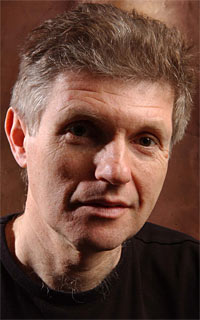


Guitarist Matt Gould and violinist Beth Ilana Schneider, who perform together under the name Duo46, created something of a stir in their previous recording, aptly named ‘Untaming the Fury’. If that showcase of 10 young composers fell short in anything, however, it was in failing to match the duo’s brilliant technique and fiery temperament with a compositional vision as equally developed.
No such problem here. The Argentine-born, Berkeley-based composer Jorge Liderman offers a piece that is, quite literally, made to order: a cycle of 46 songs without words adapted with great care from Sephardic sources for the violin and guitar. The range of musical material in the sources alone, drawing on a rich intersection of Spanish and Hebrew traditions, already provides a wealth of metric, harmonic and structural possibilities. In his liner-note, Liderman claims to have remained true to the prosody of the original songs but his masterful merging of the melody with the particular idiom of the violin make those claims academic at best. Above all, the collection superbly captures a series of emotional moods, each in two minutes or less, while moving from individual piece to piece with a palpable dramatic arc.
The musicians, for their part, deftly match the concision of each compositional idea with spontaneity of spirit. Here is all the ‘fury’ of their earlier outing, with a considerably broader range of emotional sensitivity. Nothing ever seems forced, nor for that matter does it often sound preconceived. Listening to the surface energy alone, one could imagine these songs springing to life purely from the fingers rather than the head, which in this case is rather a compliment to both performer and composer.
By Ken Smith, Gramophone July 2006

This work was premiered by Duo 46 in 2004 and was written and dedicated to the group by the composer, Jorge Liderman. In the liner notes for this album the composer wrote: “These songs highlight, at the core of their musical structure, unchanged original melodies that were sung in Ladino by the Spanish, or from the Hebrew, “Sephardic” Jews…This work reflects my impressions of past and present Spain in its vast and varied culture.”
Sadly, the composer past away in 2008 and, to my knowledge, this was one of his final works. However, that quote sums up the album very well. The original folk song elements are always present and most songs stay within a harmonic and rhythmic framework despite occasional changes in meter. Most songs average in length at one minute or one and a half minutes. Therefore, all forty-six songs fit nicely on this sixty minute release from Duo 46. The composer organized the work as a song-cycle after composing each work as a “singular musical idea.” The musical language ranges from modal to quasi tonal. The composer’s use of guitar includes some modern dissonance here and there but usually in combination with a technique (such as flurries of arpeggios) that otherwise masks the dissonance in the emotional character of the section. Listen to samples here.
This is the second review of Duo 46 work I had the pleasure to review, the first review being an album of Karl Korte’s guitar music. Again, I love the overall quality of the recording and mixing of the album. The guitar is not overly warm but very clear and occasionally has a nice bell-like quality. The balance of the guitar on the recording fits nicely with the violin. The violin, at first, comes off as the primary melodic instrument but there is plenty of melodic work for the guitar in these songs.
Duo 46 has recorded numerous albums and here they show their ability to adapt to different styles and repertoire while offering a genuine and thoughtful recording. I’m a fan of Gould’s guitar work as he is not afraid of recording the rustic side of guitar (strumming etc) while also having a very clean and clear execution at any time of his choosing. The violin work is also very impressive, particularly the ends of her phases in slow movements where bow control can be difficult. Excellent playing overall. Bravo!
The album is very enjoyable to listen to. I might have found listening to all forty-six songs in one sitting a bit hard to concentrate on. There are just so many songs. However, even as I write this review and listen to the album in the background I find my ear caught by the occasional mood or special moment which then draws me into the album. I also like the fact that the songs don’t require too much analysis but more an appreciation of each song and its individual character and qualities.
Duo 46 is an excellent ensemble making huge contributions to the recorded output of contemporary composers. As an ensemble they are musically mature and incredibly in sync with each other which only happens with a group that has covered as much musical ground as Duo 46 has since their founding in 1994. They currently reside in Sudbury, Ontario, Canada. Their repertoire includes over 400 works. An incredible group.
This album will compliment any library of ensemble works for the violin and guitar as well as bring pleasure to the general listener. The album is a very successful adaptation of traditional music to modern instruments and the composer’s style without taking away too much of the original. As the composer stated, he used the same melodies and/or implied elements of the original song to create many of the counter melodies and accompaniments. As he explains “I wanted each song to represent a unique musical image suggested by its corresponding text and original melody. However, I also wanted to create motivic ties between songs to create direction and unity.”
-Bradford Werner, Classical Guitar Canada

"Aires de Sefarad (2004) are 46 “Airs from (Sephardic) Spain” for violin and guitar taken from melodies sung in Ladino or Hebrew by Spanish Sephardic Jews in the 14th Century. These songs were taken from Isaac Levy’s collection Chants Judeo-Espagnols and arranged as violin and guitar duets by Spanish composer and Berkeley professor Jorge Liderman, who has been on quite a roll of excellence lately (see his wonderful two piano Wind-Up Toys, last issue).
These little gems clock in at a minute or two a piece. There is plenty of melodic variety in these atmospheric modal masterpieces, and Mr. Liderman rises to the considerable challenge by providing endlessly inspired accompaniments and orchestrations. I was delighted every minute. These two brilliant musicians, violinist Beth Ilana Schneider and guitarist Matt Gould, are breathtaking in their virtuosic command and sublime musicality. If you enjoy sets like Falla’s Seven Spanish Folk Songs, you must hear these. And even if that’s not your usual cup of chocolate, you should definitely hear these anyway. A delight - highly recommended."
- Allen Gimbel, ARG Juy/August 2006 ARG

Just because something’s common doesn’t mean it’s easy. Classical composers, for example, have long mined folk music for inspiration: Brahms had a thing for German folk tunes, Chopin made the Polish mazurka a mainstay of Romantic piano literature and Bartok built much of his music atop a foundation of Magyar folk song. But turning folk music into art music carries risks; namely, that the spirit and flavor of the source material — presumably the stuff that caught the composer’s attention in the first place — will get lost in the shuffle. Often it’s the rhythmic vitality and straightforward melodic appeal of folk music that catches a composer’s ear. Gussy it up too much, and you wind up with an over-pimped ride: all chassis, and no engine.
Then there’s the issue of whether the folk music in question is really folk music at all. Sometimes it can be hard to tell. For example, the melodies on which composer Jorge Liderman based the 46 short pieces of “Aires de Sefarad” (“Airs of Spain”), on the Albany Records label, seem like they ought to be the real deal. Liderman, an Argentina native who teaches at the University of California, Berkeley, has long had an interest in Sephardic Jewish music. Bits of Sephardic song have found their way into such pieces as “Notebook,” “Song of Songs” and the aptly titled “Sephardisms.”
But “Aires de Sefarad” is the most explicitly Sephardic of Liderman’s works thus far. Commissioned to write a piece for a guitar-and-violin outfit called Duo46, and inspired by a trip to Spain during which he visited the southern province of Andalusia — birthplace of flamenco, tapas and sherry, and a center of both Arabic and Jewish culture during the Middle Ages — Liderman set out to write a cycle of 46 wordless songs based on what the composer describes as “unchanged original melodies” sung by Sephardic Jews. Toward that end, he culled 46 tunes from “Chants Judeo-Espagnols” (“Judeo-Spanish Songs”), a four-volume anthology compiled by Sephardic singer and journalist Isaac Levy, who was born in Turkey and immigrated to Palestine as a child. Like Liderman, Levy studied music in Jerusalem, and he was among the earliest champions of Sephardic music in Israel.
Still, the notion that Levy’s material represents “authentic” Sephardic folk music is open to debate. By the time Levy began his archival efforts in the 1950s, Sephardic music had already been through the historical meat-grinder. Long entrenched in their diasporic homes, the Sephardic singers whose repertoire he amassed often sang Greek and Turkish songs along with their Spanish and Portuguese holdovers, and all of it was colored by Western influence. As a result, no one knows what early Sephardic folk music actually sounded like; and since the first Sephardic recordings were made in Constantinople in the early 1900s, we’re not likely to find out anytime soon.
So much for unchanged, original melodies. But only a curmudgeon would fault an artist for aspiring to capture the essence of something that doesn’t really exist. What matters most is how effectively Liderman makes use of his chosen material, and how well his compositions fare in their own right. By either standard, Liderman gets an A.
For starters, Liderman is a man who clearly values the oft-neglected virtue of brevity. Each of his settings is a model of concision; only one of them clocks in at more than two minutes in length, and many are finished in less than 60 seconds. Yet Liderman manages to cram an introduction, a full-fledged exposition and even a brief coda into almost every one. Granted, the success of each treatment depends to some extent on the strength of the germinative material, and not all the original 46 melodies were created equal; there are a couple of meandering tunes, and one or two disposable confections. But they end as quickly as the more compelling ones, which vastly outnumber the handful of duds.
Liderman is also not a man to waste the few notes he chooses to use. When confronted with a love song like “Avrix Mi Galanica” (“Open My Pretty One”) or “Mama, Yo No Tengo Visto” (“Mother, I Haven’t Seen Him”), he responds with the kind of urgent romanticism that some poor jerk with a guitar could only hope to summon while standing beneath his lover’s window. And his more rhythmic ventures, like “Morena Me Llaman” (“They Call Me Morena”) and “Diziocho Anos Tengo” (“I Am Eighteen Years Old”), are bracing in their intensity. These are not effete salon versions of folk tunes; these are full-bore, let’s-get-jiggy settings of material that was either meant for dancing, or derived from something that was.
There’s plenty of other stuff to admire, like the range of textures that Liderman pulls from the pairing of guitar and violin — compare the rich cloth of “Avra Este Abajour” (“Open Your Window”), replete with strummed chords and double-stops, with the linear counterpoint of “Andarleto, Mi Andarleto” (“Andarleto, My Andarleto”) — and the way he skillfully links his 46 miniatures into a cohesive cycle. But it’s the overall sense of passion and vigor that kept me hitting the repeat button, and made me wish that I, too, was 18 years old and knew someone named Andarleto who had a trellis worth climbing.
- Alexander Gelfand, The Forward
